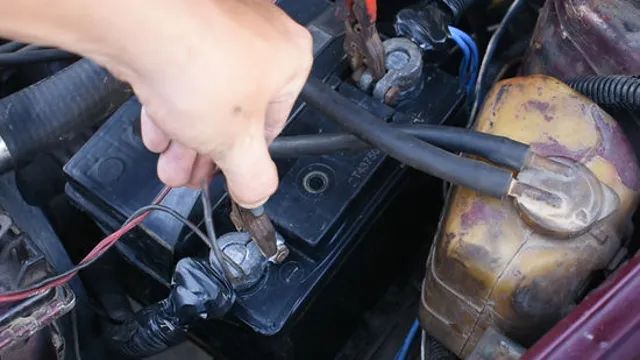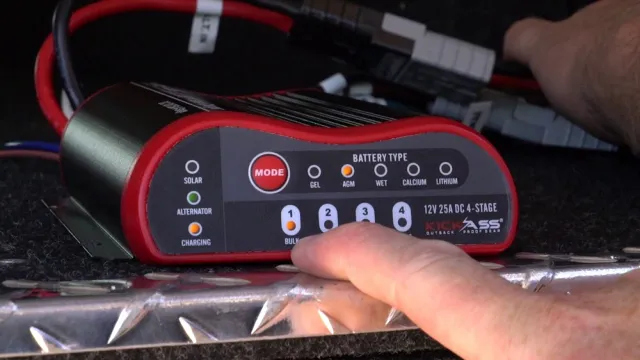Have you ever found yourself in a situation where your car battery has died, leaving you stranded and in need of a jump-start? It’s a frustrating and inconvenient experience that can be avoided by selecting the right car battery charger. With so many options available on the market, choosing the perfect one can be overwhelming. But fear not, we’ve got you covered.
In this blog, we’ll guide you through the essential factors to consider when selecting a car battery charger, ensuring that you have the right tool on hand when you need it the most. So, let’s dive in and ensure you never find yourself stranded again.
Understanding the Basics
When it comes to selecting a car battery charger, there are a few key factors to consider. First and foremost, it’s important to choose a charger that is compatible with your car’s battery. You’ll want to make sure that the charger’s voltage output is compatible with your battery’s specifications in order to avoid damaging the battery or causing any other issues.
Additionally, it’s a good idea to choose a charger with a range of charging rates, as this will allow you to tailor the charging speed to your specific needs. Another important consideration is whether the charger you choose has any safety features, such as overcharge protection or short circuit protection. These features can help to ensure that your battery is safely and effectively charged, reducing the risk of damage or other issues.
Overall, by taking the time to research and choose a high-quality car battery charger that meets your needs, you can help to ensure that your car’s battery stays in top condition for years to come.
Know Your Car Battery Type
Car Battery Type Your car battery is a crucial component that helps power your vehicle. If you want to ensure that your vehicle runs smoothly, it’s important to understand the basics of car battery types. Most cars have either lead-acid or lithium-ion batteries, but there are some hybrid and electric cars that use nickel-metal hydride or other types of batteries.
Lead-acid batteries are the most common type of car battery and have been used for decades. They are inexpensive, reliable, and easy to obtain. Lithium-ion batteries are becoming more popular due to their lighter weight, higher energy density, and longer lifespan.
Hybrid and electric cars require more complex batteries that can handle the demands of electric power. Understanding the type of battery your car uses can help you make better maintenance and replacement decisions.

Understanding Charger Types
When it comes to charging your devices, it’s essential to understand the different types of chargers available to ensure you’re using the right one. The two main types of chargers are wired and wireless. Wired chargers use a physical cable to connect to your device, while wireless chargers use magnetic fields to generate an electrical current.
The type of charger you need depends on the device you’re using, as some devices are only compatible with wired charging or have specific charging requirements for optimal performance. It’s also crucial to pay attention to the amperage and voltage of your charger to ensure it can deliver the necessary power to your device without damaging it. Understanding these basics will help you find the right charger and keep your device charged up and ready to go.
Considerations when Choosing
When it comes to selecting a car battery charger, there are a few things to consider. First and foremost, it’s important to ensure that the charger is compatible with your vehicle’s battery. Different batteries have different voltage requirements, so make sure you choose a charger that is designed for your specific battery type.
Additionally, you’ll want to consider the charger’s amperage output. A higher amperage charger can charge your battery more quickly, but it can also be more expensive and can potentially damage your battery if not used correctly. On the other hand, a lower amperage charger will take longer to charge your battery but may be a better option if you’re looking for a more affordable and safer choice.
Another factor to consider is whether you want a portable charger or a wall-mounted unit. A portable charger can be taken with you on the go, but won’t have the same charging capacity as a wall-mounted unit. Ultimately, it’s important to do your research and choose a charger that fits your needs and budget while also being a good match for your vehicle’s battery.
Amperage and Voltage
When choosing the right amperage and voltage for your electrical needs, there are a few important considerations to keep in mind. First and foremost, it’s important to understand the difference between amperage and voltage. Amperage refers to the amount of electricity flowing through a circuit, while voltage refers to the strength of the electrical current.
When selecting the appropriate amperage and voltage, it’s important to consider the specific application and the amount of power that will be required. For example, if you’re running a power tool that requires a high amount of energy, you’ll need to choose an amperage and voltage that can handle that level of power. On the other hand, if you’re powering a smaller appliance, you may be able to choose a lower amperage and voltage without sacrificing performance.
By carefully considering your needs and selecting the appropriate amperage and voltage, you can ensure that your electrical equipment runs safely and efficiently.
Charger Safety Features
When choosing a charger, it’s important to consider the safety features to avoid accidents and damage to your device. One critical safety feature is overcharge protection. Overcharging can cause your battery to overheat, which can damage the device’s components, reducing their lifespan.
Some chargers have built-in sensors that can detect when the battery is fully charged and stop the charging process, preventing overcharging. Another essential safety feature is short-circuit protection. A short circuit occurs when the positive and negative terminals of a battery come into contact, causing a current surge that can damage the battery or device.
A quality charger will have circuitry that can detect a short circuit and turn off the current flow immediately to prevent any damage. Overall, when purchasing a charger, it’s crucial to look for safety features to ensure your device’s longevity and prevent any accidents.
Portability and Convenience
When choosing a device or gadget, one of the most important factors to consider is its portability and convenience. This is especially true for those who are always on-the-go and depend on their devices to accomplish tasks or stay connected with work and loved ones. A device that is too bulky or heavy can be cumbersome to carry, while one that is too fragile or easily damaged may not be practical for everyday use.
On the other hand, a device that is lightweight, compact, and easy to use can make all the difference in terms of productivity and convenience. So, whether you are looking for a laptop, tablet, smartphone, or any other type of device, make sure to consider its portability and convenience before making a decision. It could save you a lot of trouble in the long run.
Additional Features to Look For
When selecting a car battery charger, there are several additional features that you should consider apart from the basic requirements. Look for features such as reverse polarity protection, which will prevent any damage to your vehicle’s electronics if you accidentally connect the unit incorrectly. You also want to consider the charger’s output voltage and amperage, as higher values mean faster charging times.
Some chargers also come with multiple charging modes that allow you to switch between trickle charge, maintenance mode, and fast charge depending on your needs. Another useful feature to look for is a digital display that shows the battery’s current charge status and voltage, giving you a better idea of when your battery is fully charged or needs more charging time. Ultimately, it’s important to choose a car battery charger that fits your specific needs and requirements, so make sure to do your research and choose a reputable brand that offers the features you need.
Automatic Shut-Off
When it comes to purchasing home appliances, it’s important to consider additional features that can make all the difference. One such feature is an automatic shut-off, which can provide peace of mind and prevent accidents and energy waste. This feature is particularly important in appliances that consume a lot of power, such as space heaters or hair straighteners, as leaving them on for too long can be dangerous.
An automatic shut-off not only saves energy but also ensures that the appliance turns off automatically after a certain period of time, without having to remember to do it manually. So if you’re in the market for a new appliance, be sure to check if it has this feature to avoid potential hazards and conserve energy.
Reverse Polarity Protection
Reverse polarity protection is a useful feature to have in electronic devices as it helps prevent damage caused by connecting the power source in the wrong way. It can happen easily, but the results can be costly. Therefore, having a reverse polarity protection system in place helps to ensure that your device works as intended, avoiding any unnecessary mishaps.
Other features to consider include over-temperature protection, overcurrent protection, and short-circuit protection. These additional features work together with reverse polarity protection to keep your device from malfunctioning, ensuring reliable and safe operation. When shopping for electronic devices, be sure to look for those with these added protection features to give you peace of mind.
Conclusion and Recommendations
In conclusion, selecting a car battery charger can be a daunting task, but with a bit of research and consideration, you can find the perfect fit for your needs. Remember to choose a charger that is compatible with your battery size and type, has enough amperage to handle your vehicle’s needs, and features safety and convenience features that fit your lifestyle. Just like choosing a partner, a car battery charger is a long-term investment, so take your time to ensure compatibility and reliability.
Happy charging!”
FAQs
What factors should I consider when selecting a car battery charger?
When choosing a car battery charger, consider factors such as the voltage and amperage output, compatibility with your vehicle’s battery type, safety features, and warranty.
Can I use any charger on my car battery?
No, it’s important to choose a charger that is compatible with your car battery type. Using the wrong charger can damage your battery or even pose a safety risk.
How long does it take to fully charge a car battery?
The charging time can vary depending on the type of charger and the size of your battery. In general, a 12-volt car battery with a 50-amp hour rating will take about 12 hours to fully charge with a 10-amp charger.
Can I overcharge my car battery with a charger?
Yes, overcharging can cause damage to your battery and pose a safety hazard. Make sure to choose a charger with automatic shut-off or trickle charge features to prevent overcharging.
Can I jumpstart my car battery with a charger?
Yes, some chargers have jump-starting capabilities. However, it’s important to follow the manufacturer’s instructions and recommended safety precautions when jumpstarting a battery.
How often should I charge my car battery?
It’s recommended to periodically maintain and recharge your car battery, especially if it’s not used frequently. Different types of batteries may have different maintenance requirements, so refer to your owner’s manual for specific recommendations.
Can I charge my car battery in the rain?
It’s not recommended to charge a car battery in wet or damp conditions, as this can pose a safety hazard. Always use chargers in dry conditions and follow manufacturer’s safety instructions.

